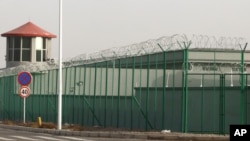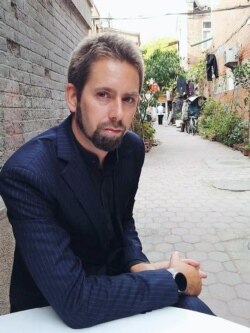In 2016, the Swedish human rights activist Peter Dahlin appeared on Chinese state television CCTV to say he had "caused harm to the Chinese government," and "hurt the feelings of the Chinese people," a confession made after about two weeks of questioning in a secret Beijing detention center.
Now, as the director of Safeguard Defenders, an NGO based in Madrid, he is speaking out against China's broadcasting of televised confessions. Dahlin has launched an international campaign to hold state-owned outlet CCTV accountable in an effort to ban forced confessions from the TV broadcasts of its overseas affiliates.
For China's President Xi Jinping, "it is a very important policy to expand Chinese soft power, the idea of telling the China story well, and for that they need media and they need the TV stations," Dahlin told VOA.
"They can either continue airing these kinds of confessions and then perhaps lose their license; or can they stop broadcasting these confessions and maintain their license to broadcast," he continued. "We think that in the end, they're going to choose the latter as keeping their TV channels operational is far more important for them than airing these confessions."
In February, the broadcast regulator in the U.K., Ofcom, revoked the license of CGTN, the overseas arm of CCTV, after an investigation.
In March, the U.S. Federal Communications Commission (FCC) said that it is reviewing a complaint from "a Spanish NGO" that CGTN and CCTV-4 violated FCC rules by broadcasting forced confessions from journalists, lawyers, NGO workers, and activists for the rule of law and human rights, as well as ordinary people, many of whom had been tortured.
The complaint alleged the videos of confessions violate the agency's rules against broadcasting "lies and intentional distortions."
In April, the French media regulator the Higher Audiovisual Council (CSA) confirmed that it had received the first complaint from Dahlin's NGO citing the Chinese state media, Global Television Network CGTN.
On April 7, the CGTN official website published a commentary calling Dahlin the "anti-China crusader." The commentary dubbed Safeguard Defenders a "true scoundrel" that "has latched onto an anti-China narrative, specifically targeting CCTV's two international channels CGTN and CCTV-4."
According to Dahlin, "One of the big problems that exists in relations between Western nations and China is that China wants to be part of the international community and get all of the bonuses that come from that, but without being held accountable to the standards."
He argued that this behavior has been encouraged by the West because "we have not been holding them accountable."
Crackdown on dissent
Dahlin is one of the first foreign victims of Xi's crackdown on dissent. On the night of January 3, 2016, authorities spirited him from his home in Beijing to a covert interrogation center. At the time, he had been running China Action, an organization that assisted China's human rights lawyers for seven years.
More than two weeks later, Dahlin appeared on CCTV.
"I have caused harm to the Chinese government," Dahlin confessed on camera, wearing a black shirt and a gray sweater. "I have hurt the feelings of the Chinese people. I apologize sincerely for this, and I am very sorry that this happened." Unlike many who confess on TV, Dahlin was not forced to wear a bright orange vest, the sign of an imprisoned criminal.
He told VOA Mandarin that during those two weeks, he was confined under residential surveillance at a designated location (RSDL) to a cell, deprived of access to his embassy. Electrodes were attached to his fingertips and tiny cameras observed his pupils during interrogation, Dahlin told The Guardian.
"The thing that really sticks in my head as some kind of trauma is that they also took away my girlfriend and placed her under RSDL simply to put pressure on me," he said, adding that she was held in the same "black jail" and was threatened with a 10-year prison sentence. According to The Guardian, his girlfriend was Chinese. "So every day I had that pressure hanging over me."
RSDL detains a person at an undisclosed location, a tactic used on human rights lawyers, dissidents and those accused of endangering state security. The individual's family and lawyers do not know where they are, and the person may be held for as long as six months.
"RSDL has long been identified by experts in the United Nations as a form of incommunicado detention," according to Jurist.
Feng Chongyi, an associate professor in China studies at the University of Technology in Sydney, told Australian media that China's secret police operate the centers and hold the person in solitary confinement while subjecting them "to continuous interrogations, sleep deprivation and other forms of torture."
Dahlin was blindfolded and put on a flight to Sweden shortly after the forced confession and was put on a travel blacklist by Beijing for 10 years. His girlfriend was released that day, he said.
"The point of these televised confessions is not only to deter the individual but to attack a larger group of people" by striking fear into those who see the broadcasts, he said. "When they put, for example, Wang Yu, a (human rights) lawyer on TV and humiliated her, the point, of course, is to attack all the lawyers that might be doing the same kind of work."
"These televised confessions are a form of political terror by any definition," Dahlin said. "That's why it's so important to stand up to them and fight back."
In April 2018, Dahlin's Safeguard Defenders published the report "Scripted and Staged, Behind the Scenes of China's Forced TV Confessions."
It analyzed the recordings of 45 confessions broadcast between 2013 and 2018 and showed that China's televised confessions were routinely forced and extracted through threats and torture. That was the start of the effort to hold CCTV accountable, according to Dahlin.
He told VOA that his objective is not to take CGTN or CCTV4 off the air.
"Our objective is to force them to stop airing these kinds of forced confessions. And we believe we've come quite a long way in achieving this goal," he said, adding that he's pleased to see positive responses from media regulators in the U.S., U.K., France and elsewhere.
"At no point do I think I'd ever consider stopping, and I think it's quite normal for many activists, lawyers and journalists that I deal with in China … a lot of their devotion and motivation comes from having suffered personally. It really drives them," he said.
"So I think the idea of torturing people, humiliating people, putting them in prison … it doesn't really work. Because once people are free, they tend to get back out there and work even harder for these issues, which is very inspiring."






